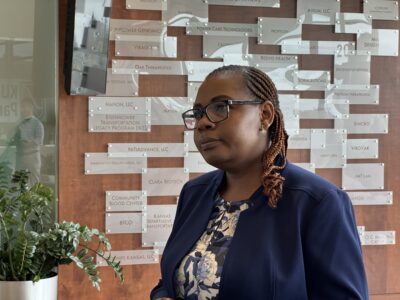Kansas Gov. Kelly sues legislative committee that revoked religious gathering order

photo by: Associated Press
Kansas Gov. Laura Kelly answers questions from reporters, Tuesday, March 17, 2020, at the Statehouse in Topeka, Kan. (AP Photo/John Hanna)
Story updated at 5:00 p.m. Thursday
Kansas Gov. Laura Kelly announced Thursday that her office has filed legal action against the legislative committee that revoked her executive order limiting in-person attendance at religious gatherings in the face of the coronavirus pandemic.
Kelly said her office is seeking an expedited ruling from the Kansas Supreme Court on the action taken Wednesday by the seven-person Legislative Coordinating Council, which is made up of leaders of the Kansas House of Representatives and Senate. Kelly said she expects to hear a decision soon.
“The last thing I want is (a) legal battle, but Kansas lives are on the line, and I took an oath to uphold the Kansas constitution,” Kelly said.
Related story
• April 8 — Governor blasts Kansas lawmakers’ vote to rescind limits on in-person religious gatherings
The action is a dramatic escalation of Wednesday’s fight over public safety versus the right to freely assemble for religious services, in which Kelly accused state Republican leaders of “petty, political distractions.”
Kelly said Thursday that while her administration to this point has worked to engage the Legislature as a whole in the decision-making process for the state, the committee’s action to revoke an executive order stands in direct violation of the Kansas Constitution.
“There’s a difference between collaboration and control,” Kelly said. “We do not have time to play political games during a pandemic. My top priority as governor is to ensure the health and safety of every Kansan.”
The legal argument against the committee’s action — which passed by a 5-2 vote along party lines — is simple, Kelly said. Both the Kansas Constitution and state statute dictate that revoking an executive order is a power that resides with the Legislature as a whole, not the seven-person committee.
The legal issue at stake concerns how far the Legislature can go in delegating its power to another group — in this case, the Legislative Coordinating Council, which is made up of the top four House leaders and the top three Senate leaders. Five of the seven members are Republicans.
Lawmakers gave the LCC the right to review Kelly’s executive orders, but it’s unclear exactly what power they have to overturn them. Conservative Republicans were upset with an order from Kelly in early March to close K-12 schools for the rest of the spring semester and wanted to block her from using sweeping gubernatorial powers granted to deal with short-term disasters.
Senate President Susan Wagle, a Wichita Republican and candidate for the U.S. Senate seat Pat Roberts is vacating, said her own church canceled Mass on its own, “not a mandate by big brother infringing on the individual freedoms given to us by our Bill of Rights.”
That is an incorrect interpretation of Kelly’s order, however, as it never prevented religious services from taking place, it just mandated that more than 10 people not be present. At no time was there an order to cancel services ahead of the Easter or Passover holiday.
Prior to announcing the legal action, Kelly began her daily briefing Thursday by announcing that she had talked with Vice President Mike Pence earlier in the day. She said he praised Kansas’ efforts to quell the spread of COVID-19 — including Kelly’s action to limit religious gatherings to under 10 people.
The controversy came amid a quieter day in Kansas with regards to the coronavirus statistics. The Kansas Department of Health and Environment announced that overnight, Kansas confirmed 60 new cases of the virus, raising the cumulative total from 1,046 to 1,106.
Those cases represent an increase of only 5.74% a day after the largest total daily case increase since the outbreak began. The state also confirmed four more deaths related to COVID-19, bringing the total to 42.
The 1,106 confirmed cases are out of 10,775 total tests, meaning 10.3% of tests came back positive for the virus. That rate continues to slowly tick upward, as last week the percentage of Kansans testing positive was between 8% and 9%.
Those numbers should be taken with the caveat that COVID-19 tests potentially have a high false-negative testing rate, according to recent research, as well as the fact that widespread testing is still not available in Kansas or the rest of the country.
Last week, KDHE began releasing more comprehensive data in its daily updates, which now include the testing rate in each of Kansas’ 105 counties. In Douglas County, 937 people had been tested either by the state or by private labs, and 38 cases had been confirmed positive as of Thursday.
The testing rate, the state said, equates to 7.66 tests per 1,000 county residents. That’s the third-highest rate among all Kansas counties.
KDHE is also tracking hospitalization rates for cases where such information is available. The department said 263 of the 847 positive COVID-19 cases that are being tracked have resulted in hospitalization thus far — a 31% rate for applicable cases.
•The Associated Press contributed to this report.
Confirmed COVID-19 cases in Kansas
More coverage: Coronavirus (COVID-19)
The Journal-World has made this coverage of COVID-19 available for free, outside of the paywall on LJWorld.com.
Find all coverage of city, county and state responses to the virus at: ljworld.com/coronavirus/
Please consider subscribing to support the local journalists who are helping to inform our community: ljworld.com/subscribe/







